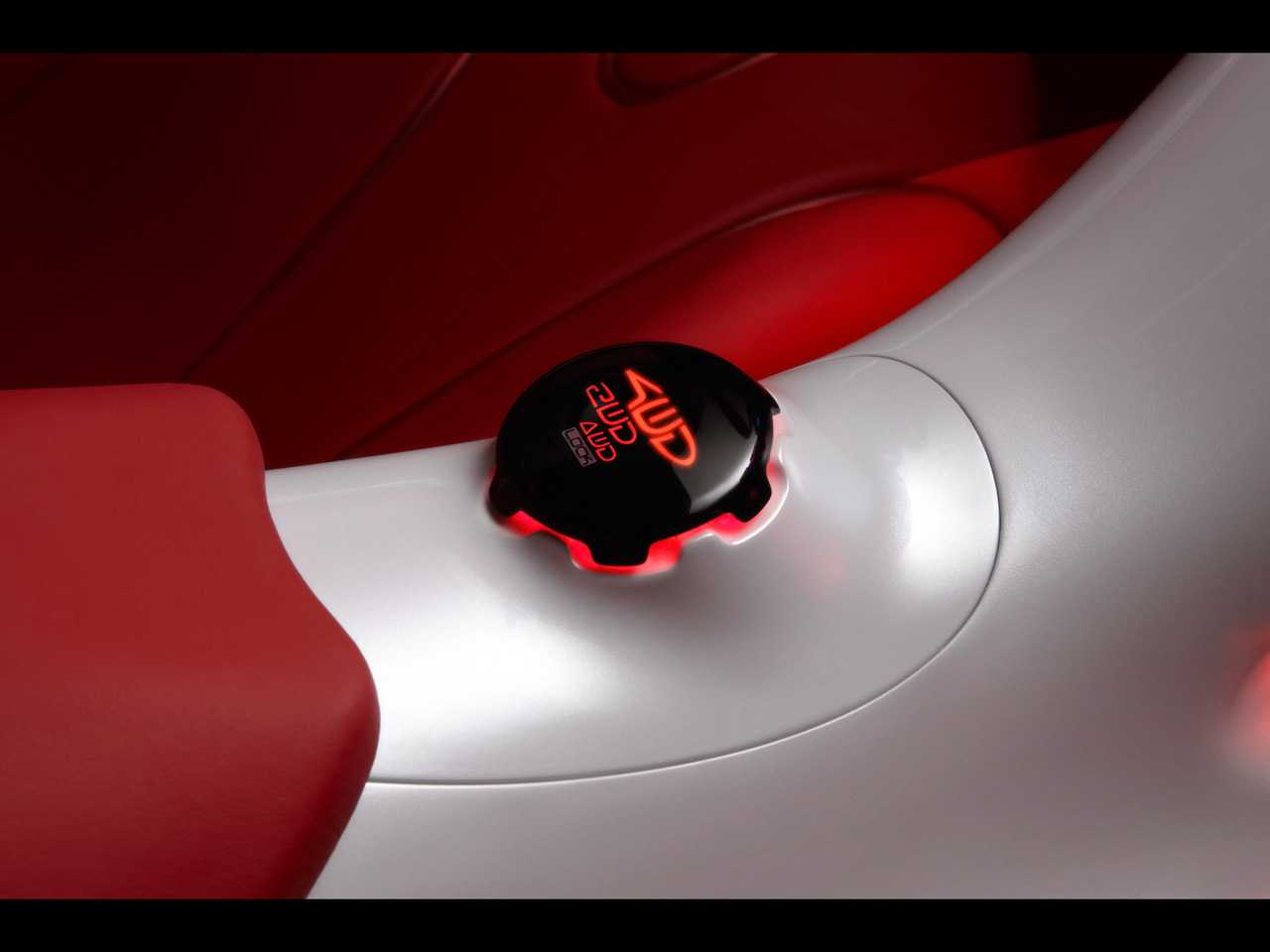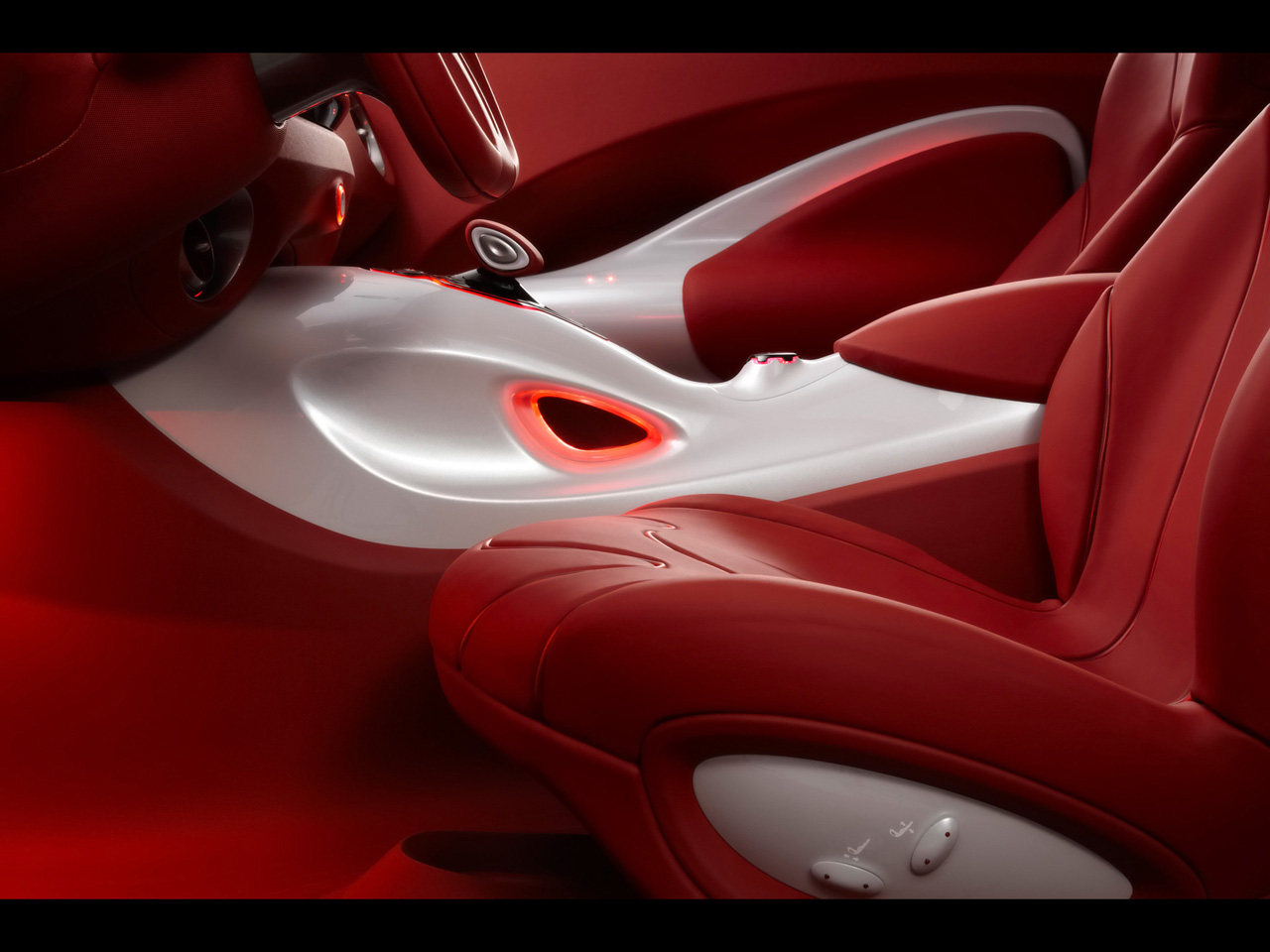2009 Nissan Qazana Concept
|
Price |
-- |
Production |
-- | ||
|
Engine |
-- |
Weight |
-- | ||
|
Aspiration |
-- |
Torque |
-- | ||
|
HP |
-- |
HP/Weight |
-- | ||
|
HP/Liter |
-- |
1/4 mile |
-- | ||
|
0-62 mph |
-- |
Top Speed |
-- |
(from Nissan Press
Release) QAZANA: THE CROSSOVER REVOLUTION CONTINUES
By introducing an alternative to the traditional family hatchback
theme, the Nissan Qashqai revolutionised one of the most
conservative sectors of the market. That success has now inspired
Nissan to see how it can reshape the small five-door of the future.
“Qazana is a concept car and was created specifically for the Geneva
Motor Show… but it should not be dismissed as a just a design study.
It gives a clear direction of how a future small car from Nissan
could look.”
Alfonso Albaisa, Vice President, Nissan Design Europe
At a glance
-- Crossover concept
reinvents small five-door
-- Inspired by motorbikes and beach buggies
-- Compact design – sporty, yet rugged
-- Designed in Europe
Cars have been dull for
too long. Mainstream machines might perform perfectly from A to B…
but sometimes drivers want to take the non-conformist route...
Fortunately Nissan has the answer. Inspired by a simple desire to
have fun behind the wheel, Qazana shows that mind-numbing motoring
could be a thing of the past.
Officially it’s a showcar, a study into how a small car of the
future could look. But with the announcement that a small crossover
– a baby brother to Qashqai – will be built at the company’s
Sunderland factory in the UK, Qazana’s significance should not be
underestimated.
“The Qazana concept is an intelligent, all-wheel drive crossover
which is masculine, agile, lean, and designed for the tough city
streets. Our team at Nissan Design Europe in London realized this
image with the motif of a modern day beach buggy and four-seat
motor-bike,” Atsushi Maeda, Studio Chief Designer, Nissan Design
Europe.
According to Matt Weaver, project lead designer at NDE, Qazana was
designed to be sophisticated but fun. “It’s a hugely optimistic car,
which is no bad thing in these difficult times. Had it been created
in the 1960s, it would have counted camper vans, bikes and buggies
as its rivals. Infused with that same spirit, there’s nothing quite
like it available today.”
Challenges tradition
In the same way that Nissan re-wrote the rule-book when it introduced Qashqai two years ago, so Qazana is ready to do it again. By approaching the small car market from a totally different direction, Qazana invigorates, stimulates and rejuvenates the traditional town runabout.
Compact dimensions
Compact overall
dimensions (4060mm in length,1570mm tall, 1780 wide and a wheelbase
of 2530mm) mean Qazana would be ideally suited to the urban
environment. Yet its advanced specification and energetic styling
suggest an ability that goes far beyond the city walls.
By mixing SUV and sports car styling cues, NDE’s design team has
created a highly individual Crossover quite unlike anything else on
the road. The tall stance, truncated rear styling and short front
and rear overhangs underscore its feeling of robustness and
strength, but the low roof line, assertive side window graphic and
broad shoulders hint at a sporting ability absent in traditional
all-wheel drives.
At the same time, rounded elements – notably the wheel arches and
bonnet – evoke a friendly ambiance and provide a link with existing
Nissan Crossovers. Indeed, Qazana has the signature Crossover design
detail in the rising window line at the rear, also found on Murano
and Qashqai.
Says Weaver: “Qazana follows in Qashqai’s wheel tracks by
challenging convention. Externally Qazana adds a number of existing
Nissan design cues – including a variation on ‘boomerang’ rear light
theme from 370Z – to a highly distinctive shape that’s unlike
anything else in the company’s current design portfolio.”
Crossover styling
The profile is dominated
by the prominent wheel arches and by the body’s high waistline,
which combine to give an impression of strength and which contrast
vividly with the slim side windows. Echoing a style first seen on
Mixim, Nissan’s high performance electric coupé concept shown at the
2007 Frankfurt Show, the glasshouse resembles a crash helmet visor.
Although it appears at first glance to be a two-door coupé, Qazana
has a further pair of rear-hinged half doors to ease access to the
rear compartment. All the doors are electrically operated and for
safety reasons the rear pair can only be activated once the fronts
have been opened. With no conventional B-pillar, access to the
interior couldn’t be easier.
One notable feature of the roof-line is the virtually straight cant
rail above the doors which adds further to the strength of the
profile. The roof itself has a pair of thin glass inserts running
the full length of the roof which allow slithers of natural light
into the cabin.
This contrast between sporty performance and all-terrain potential
is underlined by the venturi-style skid plate at the rear of the
vehicle, Qazana’s extended ground clearance and the soft rubber
spats which edge the wheel arches and help to disguise the vehicle’s
long suspension travel. The graphite coloured spats contrast vividly
with the bold exterior colour, a unique shade called White Titanium,
and the strikingly styled 20 inch black chrome alloy wheels.
Distinctive frontal aspect
The car’s face is
dominated by four headlamps. Two lower circular lamps set within the
bumper contrast with a pair of daylight running strips mounted high
on the wings on either side of the bonnet: the look is of a rally
car preparing for a night stage.
While the full width grille, dominated by Nissan’s centrally mounted
badge, is an interpretation of current Nissan styling, its
construction is not. A one-piece acrylic moulding, no cooling air
can pass through the grille. Instead, the lower portion of the
bumper, finished in a contrasting graphite colour, is dominated by a
number of large holes for air to reach the radiator. See through
acrylic mouldings are also used for the door mirrors
The interior has been designed as an extension of the exterior
thanks to a clever interplay between hard and soft materials. Rather
than being completely enveloped in leather for example, elements of
the lightweight carbon fibre seat structure are on permanent view,
appearing to have ‘broken through’ the covering. The centre portion
of the backrests features a mesh material, allowing fresh air to
circulate around the occupants.
Like the seats, the metal sections of the centre console seem to
have forced their way through the leather covering while the
internal door-frame is part exposed so that the door pull appears to
be hewn from solid metal.
Motorcycle inspired interior
Adding further to the
mechanical feel of the interior, the shape of the centre console and
armrest has been inspired by the fuel tank and seat of a sports
motocycle. Paul Ray, senior interior designer at NDE, is a keen
rider. “I enjoy the sensation of being at one with my bike and
wanted to capture that feeling in Qazana,” he says.
“The way the structure appears through the fabric of the interior
also reflects motorcycle design and construction.”
Accentuating the practical side of the car, Qazana has ‘floating’
seats centrally mounted over a one-piece rubberised floor covering,
creating an openness in the cockpit. Grooves cut in the flooring are
replicated on the seats themselves.
The dashboard is dominated by a centrally mounted screen. As well as
doubling as a navigation display, it will deliver vital information
relating to Nissan’s next generation fully electronic ALL MODE
four-wheel drive with torque vectoring system and other advanced
technical processes found on board, including integrated
communications systems. Using an intuitive touch-screen interface,
the driver will be able to adjust the air-conditioning and other key
vehicle settings.
Alfonso Albaisa, Vice President, Nissan Design Europe, says: “When
it comes to design, Nissan has developed a reputation for constantly
delivering something different. The global success of Qashqai has
proven that the car buying public is fed up with the conventional…
but we are not prepared to sit on our laurels. Qazana might seem a
radical solution but important elements of the concept do point to a
future Nissan production vehicle.
“Watch this space!”



